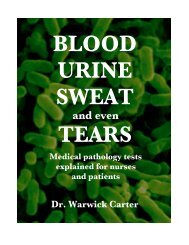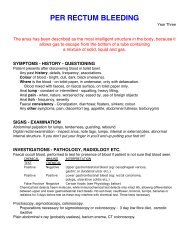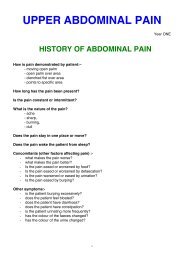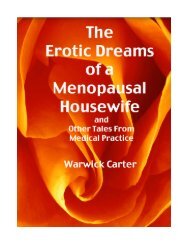Menopause A to Z.pdf - Medwords.com.au
Menopause A to Z.pdf - Medwords.com.au
Menopause A to Z.pdf - Medwords.com.au
Create successful ePaper yourself
Turn your PDF publications into a flip-book with our unique Google optimized e-Paper software.
MENOPAUSE A <strong>to</strong> Z<br />
arthritis) and other less <strong>com</strong>monly used drugs may also increase bleeding, and therefore bruising.<br />
Women bruise more than men, particularly around the menop<strong>au</strong>se, bec<strong>au</strong>se hormonal changes may make blood<br />
vessel walls weaker, and allow them <strong>to</strong> rupture easily. Many women <strong>com</strong>plain of multiple small bruises on their arms<br />
and legs, in places where they cannot recall any significant injury.<br />
Other <strong>com</strong>mon c<strong>au</strong>ses of abnormal bruising include thrombocy<strong>to</strong>penia (a lack of platelets in the blood), Cushing<br />
syndrome (over production of steroids in the body, or taking large doses of cortisone), and leukaemia (cancer of the<br />
white blood cells).<br />
When a bruise is likely, or first develops after an injury, the affected area should be cooled with ice, elevated and<br />
rested. The ice should not be applied directly <strong>to</strong> the skin, but wrapped inside a cloth. Elevation of the area reduces the<br />
pressure in the veins, and slows blood loss from the ruptured blood vessel. Any exercise or movement involving an<br />
area with a ruptured blood vessel will force more blood out in<strong>to</strong> the tissues.<br />
With time and rest the swelling will reduce, the bruise will go from blue/black <strong>to</strong> purple, brown and finally yellow<br />
before disappearing. There may be some residual swelling and firmness at the bruise site due <strong>to</strong> the formation of<br />
fibrous scar tissue and the skin over the area may dry out and flake off.<br />
If there is no apparent c<strong>au</strong>se for a bruise, medical advice should be sought.<br />
CHANGE OF LIFE<br />
The term “change of life” is used as a euphemism for the menop<strong>au</strong>se.<br />
CHORIONIC GONADOTROPHIN, HUMAN<br />
Beta human chorionic gonadotrophin (beta HCG or HCG) is secreted by the placenta. The blood level rises <strong>to</strong> a<br />
peak at 10 weeks of pregnancy, and then slowly declines. Its presence can be used as a diagnostic test for pregnancy,<br />
but can only be detected at least ten days after conception. Its presence also acts as a reliable marker for certain<br />
cancers of the ovary and testes. The interpretation of blood levels are as follows:-<br />
Less than 10 IU/L. - normal non-pregnant.<br />
20 <strong>to</strong> 100 IU/L - 1 <strong>to</strong> 2 weeks after pregnancy <strong>com</strong>mences, or menop<strong>au</strong>se<br />
100 <strong>to</strong> 6000 IU/L - 3 <strong>to</strong> 4 weeks of pregnancy, or after 6 months of pregnancy, or cancers of ovary or<br />
testicle (embryonal carcinoma or choriocarcinoma).<br />
6000 <strong>to</strong> 30,000 IU/L - increases between weeks 7 and 30 of pregnancy, and then slowly decreases.<br />
Over 30,000 IU/L - increased risk of Down syndrome (mongolism).<br />
Most HCG tests for pregnancy are performed on urine. The tests indicate whether the HCG is over a threshold level<br />
of HCG and merely indicate a positive or negative result. False positive results can occur with cancers of ovary or<br />
testes (seminomas, choriocarcinoma) or placental tumour (hydatidiform mole). False negatives are far more <strong>com</strong>mon<br />
and can occur with very dilute urine, if the pregnancy has not progressed far enough <strong>to</strong> produce sufficient HCG or with<br />
kidney diseases. The peak level of urine HCG is reached at 10 weeks pregnancy, after which it declines, so a urine<br />
pregnancy test after about 20 weeks of pregnancy may be negative.<br />
Chorionic gonadotrophin can also be injected as a medication in the treatment of infertility in women, delayed<br />
puberty in girls, failure of testicular development and failure of sperm production. It may result in multiple pregnancies<br />
and may c<strong>au</strong>se fluid retention. It must not be used by patients suffering from some types of cancer affecting the sex<br />
organs.<br />
Although chorionic gonadotropin has been prescribed <strong>to</strong> help some patients lose weight, it should never be used<br />
this way. When used improperly, chorionic gonadotropin can c<strong>au</strong>se serious problems.<br />
CLIMACTERIC<br />
The term “climacteric” is an old fashioned one for the menop<strong>au</strong>se.<br />
CYPROTERONE ACETATE<br />
The antiandrogen (acts against tes<strong>to</strong>sterone) hormone cyproterone acetate (Androcur) is used alone in women <strong>to</strong><br />
treat excessive body hair, loss of scalp hair and severe acne in women, and in men for the reduction of sexual drive,<br />
premature puberty and cancer of the prostate gland. It is <strong>com</strong>bined with ethinyloestradiol in some contraceptive pills<br />
(eg. Diane) <strong>to</strong> control acne and oily skin, as well as a being a contraceptive; and with oestradiol valerate <strong>to</strong> ease the<br />
symp<strong>to</strong>ms of the menop<strong>au</strong>se.<br />
It is not <strong>to</strong> be used in pregnancy or breastfeeding and adequate contraception must be used in sexually active<br />
women. Do not take it if suffering from severe liver disease, blood clots, sickle cell anaemia, severe depression or<br />
diabetes. It is not <strong>to</strong> be used in prepubertal girls and is for use in boys only if medically indicated. Use cyproterone with<br />
c<strong>au</strong>tion in those with diabetes and liver tumours.<br />
The side effects may include male infertility, reduced libido, tiredness, increased weight, n<strong>au</strong>sea, headache and<br />
irregular menstrual periods. Less <strong>com</strong>monly breast enlargement in men, depression, breast milk production,<br />
sleeplessness and hot flushes may occur. There is an increased risk of developing a blood clot (deep vein thrombosis).<br />
15









